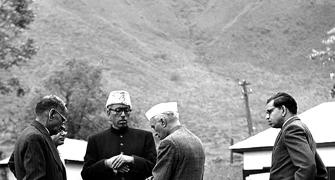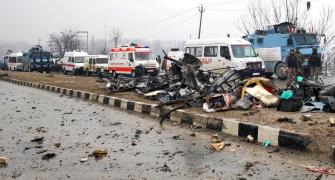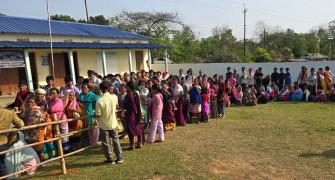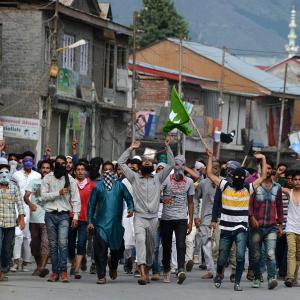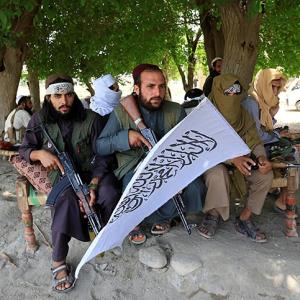Giving economic aid to Kashmir is like giving TB medicine to a patient suffering from cancer and expecting it to work, says Colonel Anil A Athale (retd).
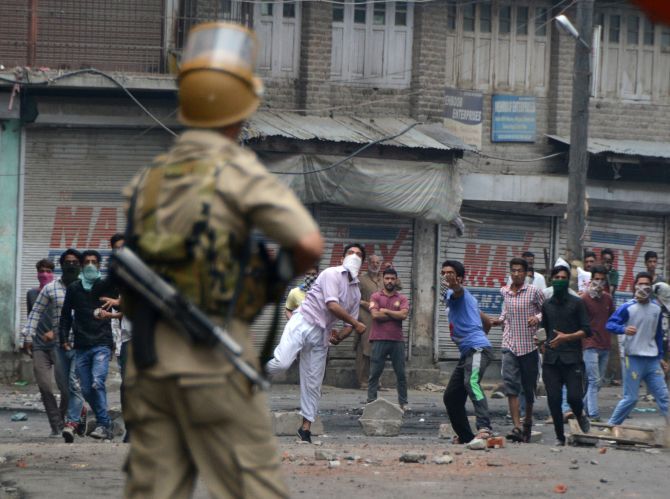 >
>
Given the abysmal standard of debates on Indian news television channels, one would have ignored the recent one on Kashmir aired on a respectable channel. The reason to react to it is that one of the participants, a former Indian intelligence czar, made some historically inaccurate comments.
In this particular debate, reference was made to the British success in Malaya against the Communist insurgency in the 1960s and the need to look at the Malayan model for Kashmir. Popularly known as the General Gerald Templer model, it has been evoked many times in the insurgency in India's north east, including the tactics of village regrouping in Mizoram and many such measures.
Having tasted success in Nagaland and Mizoram, many in the armed forces have been tempted to replicate the north eastern model in Kashmir.
As a former practitioner who has researched insurgencies in the north east, Sri Lanka, South Africa, Northern Ireland and Naxalism, and who has been monitoring Kashmir for the last 28 years, one has to emphatically state that the insurgency in the Kashmir valley is different from all these.
In fact, mindless implementation of these models in Kashmir has been one of the reasons why success has eluded us.
First, let us debunk the 'Malaya model'. The Malayan insurgency led by the Communist party of Malaya, was largely (though not exclusively) dominated by the Chinese Malayans who formed 20% of the population.
The near 40% ethnic Malayans, the Bhumiputras (sons of the soil), regarded the insurgency as an attempt at imposing Chinese hegemony.
The ethnic Malayans stood solidly behind the British effort at defeating Communism. In none of the insurgencies did the counter-insurgents have that kind of popular support.
The Malayan situation was unique and there are few lessons that can be implemented elsewhere other than some tactical innovations.
The north eastern insurgencies were also largely homegrown although till 1971, Pakistani support through erstwhile East Pakistan (now Bangladesh) as well as sporadic Chinese support were a factor.
However, neither in the case of Nagaland nor in the case of Mizoram, a merger with a neighbouring State was ever contemplated.
On the contrary, the Kashmir violence has a strong link to Pakistan and a merger with Pakistan is a demand of a section of insurgents.
Post 9/11 and the rise of Islamophobia worldwide saw a reaction in Kashmir just like in many other Muslim majority areas elsewhere.
The rise of Islamic State in Syria also had its echo in Kashmir.
Like many others, I thought that the unrest in Kashmir was due to socio-economic reasons. Our think-tank, Inpad, initiated the induction of computers and help in horticulture as an antidote in the shape of Project Hope in the early 1990s.
The armed forces launched Operation Sadbhavana and built several schools, community centres, playgrounds etc.
Yet, despite 25 year-long efforts at 'winning hearts and minds' in the Kashmir valley, the insurgency and related violence show no signs of abating.
Much influenced by the 'hearts and mind' lobby, the central government has been showering developmental goodies on the Kashmir valley.
Railway lines, 24-hour power, six-lane highways are some signs of these efforts. With the huge inflow of central aid (the highest per capita in the country), the poverty level in Kashmir valley at 6% is one of the lowest in the country.
Giving economic aid and developmental palliatives to Kashmir is like giving TB medicine to a patient suffering from cancer and expecting it to work.
Educated Kashmiris accept that Kashmir has indeed progressed economically and yet support secession, as their basic issue is 'Kashmiris are not Indians'. They have erased their pre-Islamic past as part of this new construct of Kashmiri identity.
Even Kashmiris living in the vicinity of the ancient ruins of Awantipura (the capital of King Awanti Varman in the 9th century) do not relate to it.
Evicting the Kashmiri Pandits from the valley was part of a larger design to obliterate their Hindu past.
The presence of the Kashmiri Pandits in the valley was a constant reminder of their ancestors.
In this, Kashmiri Muslims are in sync with the Pakistanis who disown the ancient Takshashila university and Panini.
The mindset in the valley is not very different from those of the Afghan Taliban who destroyed their own heritage of the Bamiyan Buddhas in 2001.
Political correctness has stopped many in India from facing this basic reality.
Kashmiris often evoke sympathy from Indian liberals by invoking a threat to their identity (as Kashmiris and Muslims) but have used their control over the state government to flood Buddhist Ladakh and dominate Jammu.
The problem of unemployment is a real one no doubt, but the reasons for that are unbridled population growth, reluctance to move out of the valley and killing the golden goose of tourism through constant violence.
In stark terms, the problem of Kashmir is neither economic nor social, but due to the inability of the people to reconcile with their own history.
Denial of one's past, one's roots and one's ethnicity has been the standard response of an average Kashmiri.
All the separatist arguments begin with the 1947 accession and Jawaharlal Nehru's ill-thought promise of a plebiscite.
The Himalayan folly of taking the issue to the United Nations continues to reverberate in the Kashmiri consciousness, reinforcing the notion that they are not Indians.
The first step to address the issue would be to withdraw our complaint from the UN and firmly declare Kashmir to be an internal problem of India.
As we were the original complainants, as per natural law, we do have the right to withdraw our complaint.
The second step is to free Jammu and Ladakh from the clutches of Kashmiri domination, a sort of internal Article 370 that protects Ladakhi and Jammu identity.
It is also time to then re-organise Jammu and Kashmir on a linguistic basis into three separate provinces.
The relative peace in the north east is due to the fact that it has been carved out into separate states, meeting regional aspirations.
In such a scenario, negotiations can begin with the Kashmir province (not the whole of Jammu and Kashmir) on the quantum of azaadi that the valley wants within the Indian Union.
Colonel Anil A Athale (retd) is a military historian who specialises in counterinsurgency.

